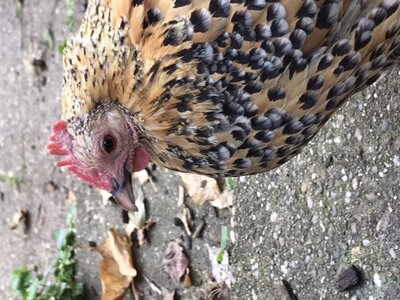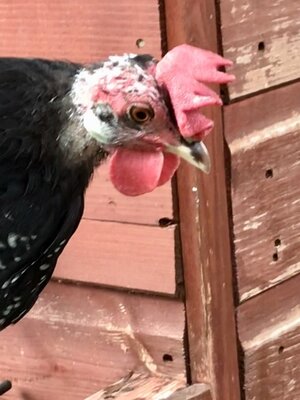acheandrea
Hatching
- Jul 29, 2020
- 5
- 2
- 5
Hi
I have 6 girls in my flock of bantams 2 x Ancona, 2 Dutch, a Pekin and my old Sablepoot and live in the UK. I have been treating them for Favus for the last 2 months. They have suffered feather loss on their heads, neck and chest. I have never had Favus in my previous flocks and still can’t work out how we have got it In this flock, we got 5 young hens last August to keep my old hen company.
I have been treating them with Canestan cream on their combs which is slowly seeing the regrowth of feathers after Intense treatment over last 2 months.
Unfortunately I have recently noticed one Ancona hen has developed black streaks along her beak and my Sablepoot has black around her beak - see photos. At the moment they seem their usual self
however the eggs production has dropped.
I have spoken to a vet but she has never heard of this problem before? She suggests no treatment unless their health worsens.
Has anyone heard of this? Could you suggest Treatment?
Any advice would be appreciated
Thanks
I have 6 girls in my flock of bantams 2 x Ancona, 2 Dutch, a Pekin and my old Sablepoot and live in the UK. I have been treating them for Favus for the last 2 months. They have suffered feather loss on their heads, neck and chest. I have never had Favus in my previous flocks and still can’t work out how we have got it In this flock, we got 5 young hens last August to keep my old hen company.
I have been treating them with Canestan cream on their combs which is slowly seeing the regrowth of feathers after Intense treatment over last 2 months.
Unfortunately I have recently noticed one Ancona hen has developed black streaks along her beak and my Sablepoot has black around her beak - see photos. At the moment they seem their usual self
however the eggs production has dropped.
I have spoken to a vet but she has never heard of this problem before? She suggests no treatment unless their health worsens.
Has anyone heard of this? Could you suggest Treatment?
Any advice would be appreciated
Thanks





